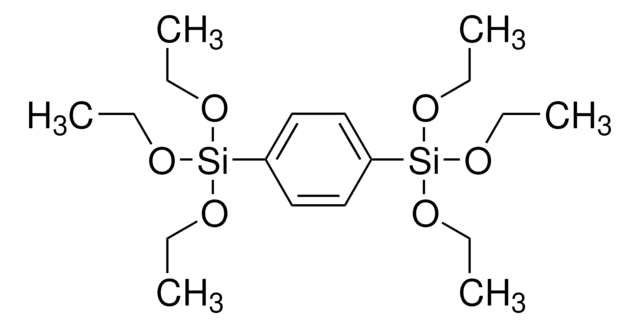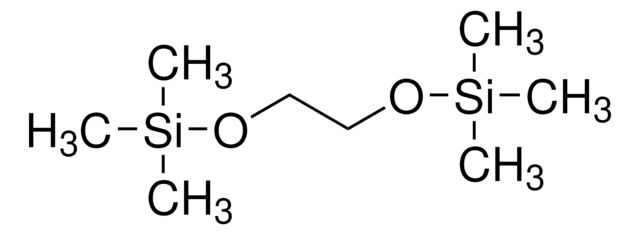447250
1,2-Bis(triethoxysilyl)ethane
96%
Synonym(s):
1,2-(Triethoxysilyl)ethane, 1,2-Bis(triethoxysilyl)ethane, 4,4,7,7-Tetraethoxy-3,8-dioxa-4,7-disiladecane, Ethylenebis(triethoxysilane)
About This Item
Recommended Products
Assay
96%
refractive index
n20/D 1.411 (lit.)
bp
119 °C (lit.)
density
0.958 g/mL at 25 °C (lit.)
SMILES string
CCO[Si](CC[Si](OCC)(OCC)OCC)(OCC)OCC
InChI
1S/C14H34O6Si2/c1-7-15-21(16-8-2,17-9-3)13-14-22(18-10-4,19-11-5)20-12-6/h7-14H2,1-6H3
InChI key
IZRJPHXTEXTLHY-UHFFFAOYSA-N
Looking for similar products? Visit Product Comparison Guide
General description
Application
Signal Word
Danger
Hazard Statements
Precautionary Statements
Hazard Classifications
Acute Tox. 3 Oral - Acute Tox. 4 Dermal - Aquatic Chronic 3 - STOT RE 1 Inhalation
Target Organs
nasopharynx,larynx
Storage Class Code
6.1C - Combustible acute toxic Cat.3 / toxic compounds or compounds which causing chronic effects
WGK
WGK 3
Flash Point(F)
235.4 °F - closed cup
Flash Point(C)
113 °C - closed cup
Personal Protective Equipment
Choose from one of the most recent versions:
Already Own This Product?
Find documentation for the products that you have recently purchased in the Document Library.
Customers Also Viewed
Our team of scientists has experience in all areas of research including Life Science, Material Science, Chemical Synthesis, Chromatography, Analytical and many others.
Contact Technical Service![Bis[3-(triethoxysilyl)propyl] tetrasulfide technical, ≥90% (NMR)](/deepweb/assets/sigmaaldrich/product/structures/242/790/625f5cba-32bd-4acf-a3be-e119e9cf844f/640/625f5cba-32bd-4acf-a3be-e119e9cf844f.png)







![Tris[3-(trimethoxysilyl)propyl] isocyanurate technical grade](/deepweb/assets/sigmaaldrich/product/structures/239/690/c24b2d6d-4580-41dd-a3ec-77f7fcb9caaf/640/c24b2d6d-4580-41dd-a3ec-77f7fcb9caaf.png)



